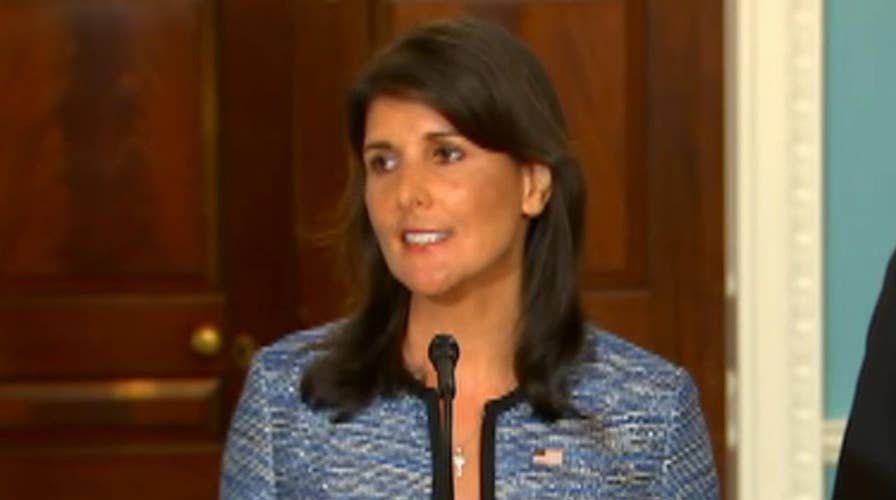Haley announces US withdrawal from UN Human Rights Council
U.S. ambassador to the United Nations blasts the Council for its 'politicized scapegoating of countries with positive human rights records.'
The Trump administration announced Tuesday it was withdrawing the U.S. from the United Nations Human Rights Council, with U.N. Ambassador Nikki Haley calling the 47-member council “a protector of human rights abusers, and a cesspool of political bias.”
Haley noted the move came after a year where “we did not see any progress.”
Haley threatened the pullout last year, citing longstanding U.S. complaints that the council showed a “chronic bias” against Israel. Calling it “an organization that is not worthy of its name,” Haley decried the membership of countries like China, Cuba and Venezuela — which also have been slammed for human-rights violations.
The announcement, though, also came just a day after the U.N. human rights chief denounced the Trump administration for separating migrant children from their parents.
“I want to make it crystal clear that this step is not a retreat from our human rights commitments. On the contrary. We take this step because our commitment does not allow us to remain a part of a hypocritical and self-serving organization that makes a mockery of human rights,” Haley said. “We did not make this decision lightly. When this administration began 17 months ago, we were well aware of the enormous flaws in the Human Rights Council. We could have withdrawn immediately. We did not do that. Instead, we made a good faith effort to resolve the problems.”
Haley said that if the council does reform, the United States “would be happy to rejoin.”
“The Human Rights Council has long been the foe of those who truly care about human rights around the world. The United States has proven, yet again, its commitment to truth and justice and their unwillingness to allow the blind hatred of Israel in international institutions to stand unchallenged,” Israeli Ambassador to the U.N. Danny Danon reacted. “We thank President Donald Trump, Secretary of State Mike Pompeo and Ambassador Nikki Haley for their leadership and call on the moral majority at the UN to hold all of its institutions accountable.”
Trump long has been critical of the United Nations’ Human Rights Council, which he has accused of showing a bias against Israel. Haley last year slammed the body for its “relentless, pathological campaign” against Israel. Trump’s National Security Adviser John Bolton opposed the creation of the body when he served as the U.S. ambassador to the U.N. under President George W. Bush.
Stéphane Dujarric, spokesman for Secretary-General António Guterres, spoke for the greater U.N.: “The Secretary-General would have much preferred for the United States to remain in the Human Rights Council. The U.N.’s Human Rights architecture plays a very important role in the promotion and protection of human rights worldwide.”
“The U.N. Human Rights Council is headed up by some of the worst human rights violators in the world. They are actually in the leadership of the Council year after year after year,” Republican Oklahoma Sen. James Lankford said. “They are anti-Israel, over and over again. That is their constant drumbeat. So, I get it, we can try to be there, so we can try to be a participant in it. But when you are there, we vote no every time, and it just becomes a problem every time as well. So it doesn’t seem to make a difference whether we are there or not there.”
A senior official added that the U.S. gave the United Nations’ Human Rights Council a year to reform, and said it had failed to do so.
The council, according to the official, protects human rights abusers and shows bias in rendering decisions. The official claimed countries like China, Egypt and Russia worked to undermine U.S. reform efforts, and that the council has passed more resolutions this year condemning Israel than Iran, Syria and North Korea combined.
The official says the Trump administration believes staying in the council lends it credibility, and only will rejoin if it reforms.
The move extends a broader Trump administration pattern of stepping back from international agreements and forums under the president’s “America First” policy.
Although numerous officials have said repeatedly that “America First does not mean America Alone,” the administration has retreated from multiple multilateral accords and consensuses since it took office.
Since taking office, the administration has announced its withdrawal from the Paris climate accord, the U.N. educational and cultural organization and the Iran nuclear deal. Other contentious moves have included slapping tariffs on steel and aluminum against key trading partners, recognizing Jerusalem as Israel’s capital and moving the U.S. Embassy to the holy city from Tel Aviv.
Haley has been the driving force behind the latest move, which would be unprecedented in the 12-year history of the council. No country has ever dropped out voluntarily. Libya was kicked out seven years ago.
The move could reinforce the perception that the Trump administration is seeking to advance Israel’s agenda on the world stage, just as it prepares to unveil its long-awaited peace plan despite Palestinian outrage over the embassy relocation. Trump’s son-in-law and senior adviser, Jared Kushner, is visiting the Middle East this week as the White House works to lay the groundwork for unveiling the plan.
Fox News’ Andrew O’Reilly, Rich Edson, Ben Evansky and The Associated Press contributed to this report.





